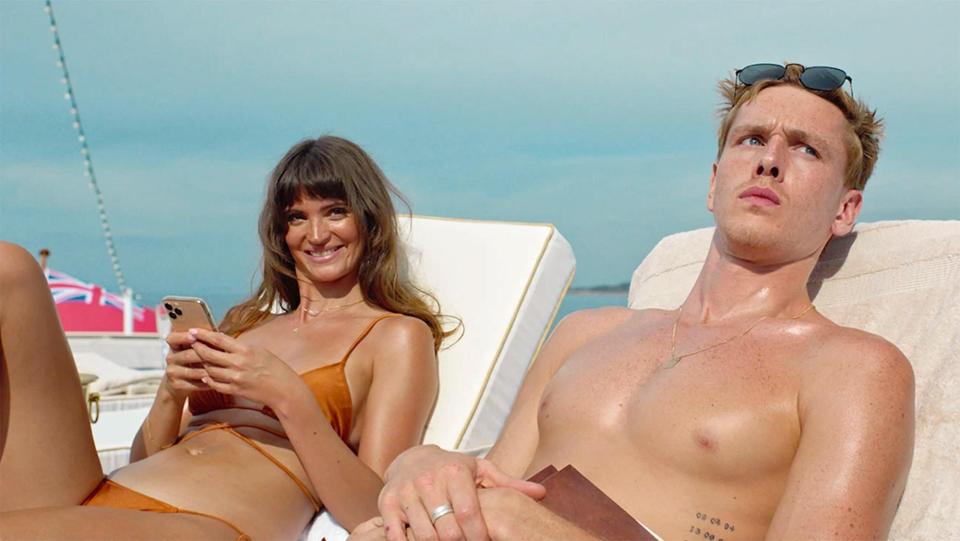Triangle of Sadness review: A wicked class satire at sea

- Oops!Something went wrong.Please try again later.
- Oops!Something went wrong.Please try again later.
Money talks, and beauty walks — it dips and spins, twirls and sashays, and stares lovingly into its own void — in Triangle of Sadness, an acid, sun-drenched satire from the incurable Swedish provocateur Ruben Östlund. Like his previous outing, 2017's The Square, Triangle drills down gleefully on privileged lives thrown suddenly into crisis; like that movie, too, it took the top prize at Cannes, the Palme d'Or. Östlund is the kind of auteur that European festivals adore: a sexy agitator who dresses his critiques of gender, class, and power in the language of lush visuals and high-gloss cringe comedy. Triangle, in theaters Oct. 7, may be his least subtle film (certainly less than his 2014 breakout, the taut ski-holiday nightmare Force Majeure), but it's also his most absurdly entertaining, and possibly his best shot so far at a mainstream American crossover.
The director has two near-perfect muses in Harris Dickinson and Charlbi Dean as Carl and Yaya, a fashion-model couple whose almost obscene aesthetic symmetry doesn't necessarily translate to their relationship. He's gorgeous and needy, a paragon of talky Gen-Z anxiety; she's gorgeous and a little bit ruthless, a social Darwinist with a low tolerance for Carl's constant tsunami of feelings. Somewhere in between bookings, they've accepted a trip on a luxury super-yacht — Yaya's also an influencer, so it's all expenses paid — and made enough peace to carry on for a while, as long as Carl stays obligingly quiet and takes all the "casual" bikini snaps she needs for her feed.

Neon
The other guests are mostly older, and more accustomed to the dividends of extreme wealth: a jolly clown-haired Russian named Dmitry (Zlatko Buriić) who made his millions in fertilizer; the wheelchair-bound Therese (Iris Berben), debilitated by a stroke but still alert to everything; Jorma (Henrik Dorson), a balding, awkward tech wizard. There's even a genteel pair of British retirees (Amanda Walker and Oliver Ford Davies) who look like they should be on a box of tea — though in fact, they explain cheerfully, their money comes from munitions (you know, just regular peace-keeping stuff like hand grenades and I.E.D.s). The bright-eyed staff who serve them all, overseen by a diligent ice-blonde manager called Paula (Vicki Berlin), are accommodating to a fault; no detail is too small, no guest request too petty or outrageous to be met. But what's going on with the captain (Woody Harrelson)? He won't come out for dinner in his dress uniform, and there's a whole lot of liquor bottles and old socialist literature clanging around in his quarters.
Harrelson, once he emerges, looks like he hasn't enjoyed himself this much on screen in a long time, though it's better to know as little as possible about what transpires after the movie's midway point — except that there's a reason little airsick bags were left, winkingly, on every chair in early press screenings. (The story behind the title, too, is too good to spoil, though the explanation for that comes gratifyingly early on.) The tone and setting shift significantly in the film's back end — it's meant to be jarring, and it is — but that narrative swerve also gives Filipina actress Dolly de Leon a chance to shine as Abigail, a middle-aged custodial worker on the ship who may have a better read on Machiavelli and trade economics than anyone.
Hers is the kind of stealth performance that awards-season breakouts are made of, and Dickinson and Dean are consistently fun as archetypes whose flaws are actually articulated; they're messy, mercurial canvases for the director, not just beautiful blanks. (Dean died suddenly last month at 32, which adds a strange bittersweet postscript to her presence here.) Östlund's sense of irony can sometimes veer toward the obvious or flat-footed; his targets — the self-regarding follies of the uber-rich, the inanity of social media, beauty as currency — are so broad and shiny that the occasional dip feels almost inevitable. But Triangle hits more marks than it misses, and in a somber, often underwhelming season of would-be arthouse hits, the movie is a bona-fide trip: not the funhouse mirror we need for these ridiculous times, maybe, but one we deserve. Grade: B+
Related content:

